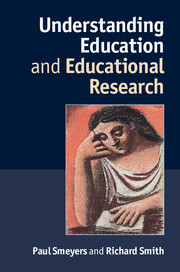Book contents
- Frontmatter
- Contents
- Acknowledgements
- Introduction
- 1 Education and its research
- 2 The nature of social science
- 3 The idea of method
- 4 The nature of philosophy
- 5 The art of research
- 6 Language, truth and meaning
- 7 On the dominant nature of educational research and its shortcomings
- 8 Research, policy and practical reasoning
- 9 The limits of measurement
- 10 Parenting and government intervention in the family (case study I)
- 11 Researching happiness and well-being (case study II)
- 12 Philosophy and research
- Notes
- References
- Index
3 - The idea of method
Published online by Cambridge University Press: 05 November 2014
- Frontmatter
- Contents
- Acknowledgements
- Introduction
- 1 Education and its research
- 2 The nature of social science
- 3 The idea of method
- 4 The nature of philosophy
- 5 The art of research
- 6 Language, truth and meaning
- 7 On the dominant nature of educational research and its shortcomings
- 8 Research, policy and practical reasoning
- 9 The limits of measurement
- 10 Parenting and government intervention in the family (case study I)
- 11 Researching happiness and well-being (case study II)
- 12 Philosophy and research
- Notes
- References
- Index
Summary
‘There is no method except to be very intelligent.’
(T. S. Eliot, 1921)There is a history behind the adulation of the scientific and empirical in the west: behind its ‘scientism’, which is obsession with science or even faith in it, as opposed to respect (and gratitude) for its obvious achievements. To trace this history, or perform a ‘genealogy’, in Foucauldian terms, is to suggest that what we take for granted – here, the obsession with science – is simply or merely the outcome of contingent circumstances that might have been otherwise. (It should nevertheless be noted that this does not prove that a particular set of values is worth less. Everything has to come from somewhere, and is not relegated to less standing in virtue of that.)
The history here is that at around the end of the sixteenth century and the beginning of the seventeenth, western Europe entered what is now known as the Era of Scientific Revolutions. In England Boyle and Hooke gave their names to laws governing the behaviour of gases and springs respectively; Harvey is credited with discovering the circulation of the blood (although this appears to have been known in China and the Arab world several centuries earlier). Elsewhere in Europe, Vesalius systematised anatomy, Galileo developed powerful new telescopes and established that the Earth goes round the Sun, and Leeuwenhoek’s improvement of the microscope made something like modern microbiology possible. Leibniz and, later in the seventeenth century, Isaac Newton developed the mathematics that science needed for its advances. The development of science, which in fact at this time was called ‘natural philosophy’, was formalised through the foundation of the Royal Society in London in 1665 and similar bodies elsewhere in Europe and America.
- Type
- Chapter
- Information
- Understanding Education and Educational Research , pp. 49 - 62Publisher: Cambridge University PressPrint publication year: 2014



